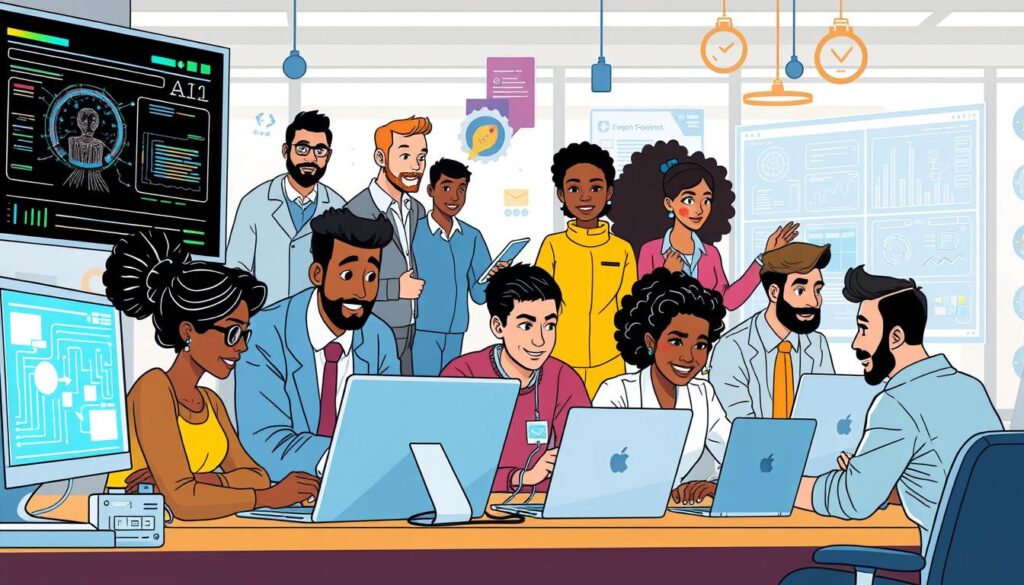In 2023, the U.S. saw a slowdown in tech talent growth, with only a 3.6% increase. This slowdown hides a big change in the job market. Now, non-tech sectors are growing faster than tech in hiring AI talent.
The Professional & Business Services sector added 49,760 tech talent jobs in 2023. The Transportation, Warehousing & Wholesale sector added 45,390 jobs. Both sectors grew more than the high-tech industry, which added 28,978 jobs.
AI talent demand is rising fast. By June 2024, AI job postings made up 14.3% of all tech talent jobs in the U.S. This is a big jump from 8.8% in late 2019. Software developers and programmers are especially in demand, making up 72% of new tech talent jobs in 2023.
Key Takeaways
- The demand for AI talent is surging across industries, with non-tech sectors outpacing the high-tech industry in hiring.
- AI’s share of total U.S. tech talent job postings increased from 8.8% in late 2019 to 14.3% in June 2024.
- Software developers and programmers comprise 72% of all new tech talent jobs in 2023, highlighting the crucial role of AI-focused roles.
- The Professional & Business Services and Transportation, Warehousing & Wholesale sectors added the most tech talent jobs in 2023.
- The AI and machine learning job market is witnessing unprecedented growth driven by increasing industry demand and AI-driven recruiting solutions.
Current State of AI Talent Market
The AI talent market is booming, with San Francisco, Seattle, and New York leading the way. These areas have 44% of the 285,235 AI jobs in the U.S. In Canada, Toronto, Vancouver, and Montreal are the top spots for AI talent, holding 60% of the 41,374 AI jobs.
Growth Statistics and Market Size
AI job postings have skyrocketed, growing tenfold in just a year. Generative AI has seen a 75-fold increase from April 2022 to April 2024. Now, AI jobs make up about 2% of all job postings in the U.S., showing how fast the demand for AI talent is growing.
Key Employment Trends in 2024
Studies show one-third of companies use generative AI regularly. Almost a quarter of C-suite leaders use it daily. This has led 40% of companies to boost their AI investment, thanks to generative AI’s progress.
Geographic Distribution of AI Jobs
| Region | AI Tech Jobs | Percentage of Total |
|---|---|---|
| San Francisco Bay Area | 97,080 | 34% |
| Seattle | 28,524 | 10% |
| New York Metro | 28,099 | 10% |
| Toronto | 17,360 | 42% |
| Vancouver | 7,447 | 18% |
| Montreal | 6,567 | 16% |
Non-Tech Industries Leading the AI Hiring Wave
The tech industry is slowing down in hiring, but non-tech sectors are leading the way. They are looking for Data Scientists and Deep Learning Architects. Companies in healthcare, finance, marketing, e-commerce, and manufacturing are using AI to innovate and automate.
The Professional & Business Services sector added the most tech talent jobs last year, with 49,760 new positions. The Transportation, Warehousing & Wholesale sector followed closely, adding 45,390 tech jobs. This shows how non-tech industries are recognizing AI’s potential to transform their businesses.
| Industry Sector | Tech Talent Jobs Added in 2023 |
|---|---|
| Professional & Business Services | 49,760 |
| Transportation, Warehousing & Wholesale | 45,390 |
In the Puget Sound region, AI job postings have grown by 166% in the last year. There are now about 3,200 open positions. Seattle is now the fourth-highest AI job market in the country, with 1,300 open positions as of August.
But finding the right AI talent is getting harder. In Seattle, AI positions stay open for 33 days on average. This is nearly twice as long as the national average of 17 days. It shows the challenge of finding skilled candidates to meet the industry’s needs.
AI Industry Talent Demand: Market Analysis
The demand for AI talent is skyrocketing, making the job market very competitive. Companies from all industries are looking for people with AI skills. This includes AI Product Managers and AI Ethics Consultants. The shortage of talent is pushing up salaries and opening new doors for skilled workers.
Salary Trends and Compensation
AI software and hardware developers are in high demand, leading to higher pay. Tech industry wages are 17% above the U.S. average. Software developers at tech companies saw a 12% increase in wages last year. AI roles pay more than 77% more than other fields.
Most In-Demand AI Roles
- Software Developers
- Programmers
- Data Scientists
- AI Researchers
Industry-Specific Requirements
AI professionals need similar core skills, but each industry has its own needs. For example, healthcare, finance, retail, and manufacturing use AI in different ways. Those who understand both AI technology and industry-specific challenges are in high demand.
| Industry | AI Applications | Key Requirements |
|---|---|---|
| Healthcare | Predictive analytics, personalized medicine, medical imaging analysis | Domain expertise in healthcare, strong data analysis skills, understanding of medical terminology and regulations |
| Finance | Fraud detection, automated trading, risk management | Financial industry knowledge, expertise in statistical modeling and quantitative analysis, understanding of financial regulations |
| Retail | Personalized recommendations, inventory optimization, supply chain management | Familiarity with consumer behavior, data mining and visualization skills, understanding of retail operations and logistics |
The AI industry is growing fast, and the need for skilled professionals will keep increasing. To stay competitive, AI professionals must keep learning and improving their skills. This will help them take advantage of the many opportunities in this exciting field.
Top AI Talent Markets and Tech Hubs
The San Francisco Bay Area, Seattle, New York Metro, Toronto, and Austin are the top tech talent markets in the US and Canada. These places are drawing a lot of AI Business Strategists and Machine Learning Engineers. They want to work on the latest AI projects.
Some new markets are also growing fast. Salt Lake City, Raleigh-Durham, San Diego, and Detroit have moved up in rankings. In Canada, Toronto leads in tech talent and added 95,900 jobs from 2018-2023. Calgary and Ottawa saw the biggest growth in Canada.
Latin American tech hubs also saw a 54% growth in tech talent from 2018-2023. Mexico City, São Paulo, and Santiago are now major players in AI. This shows AI is becoming more important in these emerging economies.
| Market | Tech Talent Concentration | Tech Talent Growth (2018-2023) |
|---|---|---|
| San Francisco Bay Area | 12.3% | – |
| Seattle | 12.3% | – |
| Toronto | – | 95,900 new jobs |
| Calgary | – | 78.1% |
| Ottawa | – | 51.7% |
These tech hubs are booming, creating a big need for AI talent. They are the centers of innovation. They are the best places for AI Business Strategists and Machine Learning Engineers to find great jobs.
Essential Skills and Qualifications for AI Professionals
The need for Artificial Intelligence (AI) experts is growing fast. Employers look for people with a mix of technical skills, soft skills, and education. These include Natural Language Processing Specialists and Computer Vision Experts. They play a key role in making AI work in many fields.
Technical Competencies
AI skills start with knowing machine learning, data analysis, and programming languages like Python and R. These experts must be good at creating, training, and using AI models to solve big problems.
- They need to know about machine learning types, like supervised and unsupervised learning.
- They should be good at getting data ready, making features, and improving models.
- They must have a strong math and stats background, and know numerical computing.
- Knowing deep learning tools like TensorFlow and PyTorch is also important.
Soft Skills and Business Acumen
AI is now part of business, so employers want professionals with soft skills and business knowledge. These skills help them explain tech ideas, work with teams, and use AI to help the business grow.
- They need to think critically and solve complex problems.
- They should be able to explain tech ideas to people who don’t know much about it.
- Working well with teams, including business leaders, is key.
- They should understand how AI helps the business meet its goals.
Educational Requirements
AI pros used to need advanced degrees in computer science or data science. But now, the AI job market values experience and skills more than ever.
| Degree Level | Typical Coursework | Relevant Certifications |
|---|---|---|
| Bachelor’s Degree | Algorithms, Data Structures, Machine Learning, Natural Language Processing | AWS Certified Machine Learning – Specialty, Google Cloud Certified Professional Data Engineer |
| Master’s Degree | Deep Learning, Computer Vision, Reinforcement Learning, Robotics | NVIDIA Deep Learning Institute Certification, IBM Certified Data Scientist Professional |
| Doctoral Degree | Advanced Topics in AI, Computational Neuroscience, Quantum Computing | SAS Certified Advanced Analytics Professional, GIAC Artificial Intelligence Professional |
The best AI pros will have technical skills, business smarts, and a love for new ideas. By working on these skills, future Natural Language Processing Specialists and Computer Vision Experts can have exciting careers in AI.
Federal Government’s AI Talent Initiative
The U.S. government has started a National AI Talent Surge. It aims to bring in AI Researchers and Data Scientists to work in government. This effort is to use AI in government, improve AI rules, and grow the AI research and development area.
The Federal Government is looking for many AI and AI-related jobs. These include data scientists, operations researchers, product managers, software engineers, legal experts, and AI-focused program managers.
Many people have applied for these AI jobs, with some programs seeing huge increases. Over 150 have been hired since October 2023.
The AI Talent Surge includes a big hiring push for data scientists in the federal government. The Tech to Gov Forum and Virtual Job Fair drew over 1,700 people from all 50 states. They had 1,746 one-on-one chats with agency reps.
To help find AI talent, the Federal Government has made hiring easier. It has also set up the AI and Tech Talent Task Force. This group, started by President Biden’s Executive Order, is leading the hiring efforts and working to make finding AI talent smoother.
The government is serious about building a strong AI workforce. It’s working hard to find the right AI skills, guide hiring based on skills, and work with experts. This will help make sure the initiative is a success.
“The Federal Government’s AI Talent Surge is a big step towards using AI for innovation and solving big problems. By getting the best AI Researchers and Data Scientists into government jobs, we’re ready to make AI work for the American people.”
Impact of AI on Traditional Job Roles
Artificial Intelligence (AI) is changing traditional jobs in many fields. A study found that 41% of leaders think their business will change a lot in five years. They plan to use AI to rebuild their processes from the start. Also, 42% want to train teams of AI bots to do many tasks.
Transformation of Existing Positions
AI’s impact isn’t just in tech. More people outside tech are learning about AI, with a 160% increase in LinkedIn Learning courses. This shows a big need for AI Product Managers and Deep Learning Architects. They help connect tech with business plans.
Emerging Job Categories
New jobs are coming as AI changes the job market. For example, AI ethics consultants make sure AI is used right. AI business strategists make sure AI fits with company goals. AI Product Managers lead the way in making and using AI products.
| Emerging AI Job Roles | Key Responsibilities |
|---|---|
| AI Ethics Consultant | Ensure ethical and responsible development and deployment of AI systems |
| AI Business Strategist | Align AI initiatives with broader organizational goals and strategies |
| AI Product Manager | Manage the development and deployment of AI-powered products and services |
AI’s impact isn’t just in tech. Companies in many fields are using AI to get better. This leads to new jobs and changes in old ones.
Challenges in AI Talent Acquisition
Companies are finding it hard to get the right AI Ethics Consultants and AI Business Strategists. Over half of business leaders (55%) worry they can’t find enough talent for AI jobs soon.
Finding AI talent is tough because many employers want both tech and non-tech experts. AI changes fast, making it hard for everyone to keep up with new skills.
It’s also important to use AI ethically to avoid unfair hiring. AI should help, not replace, human judgment in hiring. This ensures fairness and empathy in the process.
Yet, AI can make hiring easier. It can quickly check resumes and suggest candidates. This makes hiring faster and opens up more talent.
As AI in hiring grows, finding the right balance is key. Companies need to use AI wisely but also keep the human touch in hiring.
“88% of respondents to a survey reported using generative AI to enhance their jobs.”
By tackling these issues and using AI well, companies can attract top AI Ethics Consultants and AI Business Strategists. This will help them succeed in AI.
Diversity and Inclusion in AI Workforce
The AI industry is growing fast, and it needs more Machine Learning Engineers and Natural Language Processing Specialists. It’s realizing how important diversity and inclusion are in its workforce. Slowly but surely, the talent pool is becoming more diverse.
Current Demographics
Recent data shows a positive trend. More tech degree graduates from underrepresented groups are entering the workforce. Women in tech degree programs are also on the rise, showing a brighter future for diversity in AI.
Industry Initiatives
AI companies are taking action to attract a diverse range of candidates. They’re focusing on hiring more women, people of color, and others who are underrepresented. This move is crucial for creating AI systems that are fair and unbiased.
“Companies with at least 25% of AI development employees representing racial or ethnic minorities are more than twice as likely to be high-performers.”
But, there are still hurdles to overcome. For example, only a small percentage of AI PhD graduates in the US are African American or Hispanic. Fixing this pipeline issue is key to lasting diversity in AI.
The AI industry must keep working on diversity and inclusion. A diverse workforce is essential for AI to truly benefit everyone. By embracing diversity, AI can meet the needs of all communities.
Future Projections for AI Talent Market
The AI talent market is set for explosive growth. Employers are on the hunt for Computer Vision Experts and AI Researchers. They’ve seen a 323% jump in hiring over eight years. This trend will only get stronger as AI becomes key in all industries.
Soon, AI skills will be as important as experience in hiring. Already, 66% of business leaders say they won’t hire without AI skills. As AI gets more complex, we’ll see more specialized roles emerge.
- Since 2022, generative AI-related job posts have increased 75-fold.
- The machine learning market is predicted to rise from $140 million US dollars to nearly $2 trillion by 2030.
- The demand for AI research scientists is expected to grow over 20% higher by 2033.
- The US Department of Labor projects around 20,800 new data science jobs to open each year.
As AI changes the workforce, employers must update their hiring and training. Those who attract and keep Computer Vision Experts and AI Researchers will lead in the digital future.
“The need for AI skills is intensifying by 2024, showcasing a continuous growth in the AI talent market.”
Conclusion
The AI industry is changing fast, with a big need for skilled workers in AI and data science. Companies are using AI and machine learning more, so they need experts. The Federal Government’s AI Talent Surge shows how important it is to build a strong AI workforce.
The job market for AI talent is tough, with big tech companies and startups looking for people. But, there are lots of chances for those with the right skills. Jobs in healthcare, finance, automotive, and agriculture show how valuable AI skills are.
As AI keeps growing, it’s key for workers to keep learning and adapting. By using AI and having a diverse team, companies can really benefit from this technology. This helps them innovate and succeed in many fields.







